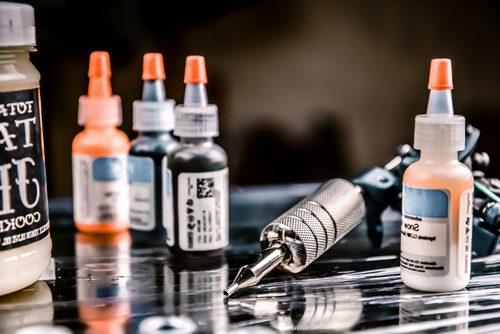
Tattoos are widespread, with many people using the permanent body art as a means for self-expression. Nearly one third of Americans have at least one tattoo and 22% have more than one, according to data from the Pew Research Center.
Despite the growing prevalence of tattoos, stigma still exists as age-old stereotypes persist regarding tattoos. In job roles associated with professionalism and leadership, they’re especially stigmatized, so tattoos can be less common among certain career demographics, like healthcare professionals. In a poll on Sermo, 90% of physicians reported that they do not have a tattoo.
Here we’ll delve into current perceptions of doctors with tattoos in healthcare settings. Insights from Sermo community members illustrate professional views on doctors’ tattoos, and whether tattoos can hinder your career prospects.
Are tattoos still taboo in the workplace?
In many professions, small tattoos are typically deemed passable. Even so, job applicants may face recruitment discrimination. One study found that job candidates with visible tattoos were perceived as less pleasant to work with, less agreeable, less conscientious, and less manageable.
In the field of medicine specifically, a doctor’s tattoos or lack thereof may affect their patients’ opinions of their competency. Research indicates that physicians’ appearance impacts their patients’ perceptions of them, with female physicians facing even higher standards than male physicians.This can vary by location, but generally, the expectation for a doctor to dress in traditionally conservative attire is widespread. In that type of clothing, visible tattoos in healthcare settings would have to be in places considered more extreme and less accepted, like the hands, neck, and face.
Do hospitals and clinics have specific policies regarding visible tattoos?
Public perceptions aside, some physicians may need to avoid tattoos due to hospitals’ policies. Often, policies prohibit any tattoo that may be considered explicit or offensive – as well as face tattoos.
Some policies allow small tattoos to be visible but require large tattoos in visible areas like the neck, face or arms to be covered in public-facing roles—unless doing so would be an infection control risk. For example, if a doctor is working with patients who are highly contagious, short-sleeve scrubs may be required to prevent cross-contamination. (For instance, Confluence Health in Washington has this policy.)
Other policies, e.g., that of UCI Health in Orange County, California, allow for tattoos of any size that aren’t deemed offensive as long as they’re not on your face. UCI Health also makes exceptions for culturally or religiously significant face tattoos.
A general practitioner on Sermo argues that policies should take context into account. “I think we must stop stigmatizing tattoos, it is not bad to have one or more, we must change that thought, however we must also consider the meaning and type of tattoo, an example would look very bad and unprofessional and ethical to have a Nazi symbol or a symbol that is an offense to any person,” they write.
What do patients think about doctors with tattoos?
While studies have established that doctors’ appearances affect their patients’ perceptions, tattoos in particular may not lower their opinions. One study found that patients didn’t perceive physicians’ competence, professionalism, caring, approachability, trustworthiness or reliability differently depending on whether or not they had visible tattoos.
However, in an earlier study from 2015, patients had slightly lower confidence in practitioners with tattoos, especially if they also had facial piercings. One family medicine practitioner on Sermo believes that patients still look down on tattoos, particularly older patients. “Personally, I think it is a matter of image and in my case when dealing with many older patients it can generate a bit of rejection to be treated by a doctor with a tattoo and this may be a prejudice, but they exist,” they write.
Professional views on doctors with tattoos
As for physicians themselves, Sermo data suggests that the group is split as to whether tattoos go against the public image of a doctor. In a recent poll, 49% of respondents voted that they do, 20% voted that they don’t, and 31% responded that it depends on the tattoo.
Those who participated in the poll shared various rationales for their responses. These were some common themes:
Professional image
In the poll on Sermo, the most popular reason physicians cited for avoiding tattoos was concern about their public image, accounting for 32% of respondents. “I do not have tattoos and I am not against them, but a doctor is a public image and should hide his tattoos (if he has them) from the patient’s view,” one urologist writes.
Several other doctors agreed with this sentiment. “Tattoos are done for various reasons, but as a health care provider it should be placed in an unexposed area, for the dignity and respect of the profession,” one general practitioner opines. 51% of surveyed doctors thought that those who do decide to get a tattoo should place it in an unexposed area.
Infection risk
Many doctors were less concerned with image and more focused on the medical implications. Tattoos involve skin penetration, which carries an inherent risk of infection if proper hygienic and sterilization practices are not followed. Common infections associated with tattoos include bacterial skin infections and, more rarely, transmission of bloodborne viruses such as hepatitis B, hepatitis C, and HIV. These risks are primarily related to the tattoo process itself rather than the presence of healed tattoos on a person. When tattoo artists adhere to professional guidelines, tattoos typically do not compromise healthcare safety.
16% of surveyed physicians selected infection risks as their main barrier to getting a tattoo. “I would never consider having a tattoo as they are an infection risk, I do not think they are attractive and they can hide future or present skin lesions eg melanoma,” one general practitioner writes.
Another GP shared a similar view. “A tattoo is an attack on the skin, at the very least, so I consider that it is not a good example that a doctor takes it,” they write. “For the rest, everyone is free to do what they want with their body.” One gastroenterologist holds a more extreme view. “No human being should use tattoos, much less a doctor, who should be an example,” they stated on Sermo.
Personal choice, acceptance, and destigmatization
Those who were in favor of physicians having tattoos commonly framed the decision as a matter of personal autonomy. “A tattoo should be a very personal decision and not be stigmatized by others,” writes a neurosurgeon on Sermo.
Some doctors who have tattoos themselves chimed in. “In particular, I have several tattoos and I know colleagues who are also tattooed,” writes one general practitioner. “I am in favor that a doctor can be tattooed, as long as he does not lose his vocation or the desire to help his patients, a tattoo does not define how good or bad you are.”
Other community members shared this sentiment that body art is not a signifier of skill or character. “Information and medical learning is in the brain, not in the tattoo; the rest are prejudices, but I respect and accept tattooed people or doctors, although I would not really do one,” writes another GP.
One internal medicine physician framed anti-tattoo sentiment as an unethical form of discrimination. “Personally, I’m ok with tattoos, but some people might be offended,” they write. “In the spirit of inclusiveness and acceptance, I think tattooed people should be able to work like everyone else and not have to hide their tattoos.”
Key takeaways
While public perception moves toward acceptance of tattoos over time, many still believe that visible tattoos in healthcare settings are inappropriate, holding doctors to a higher standard of professional appearance.
Hospital and clinic dress codes often state that they prohibit tattoos to maintain a professional image. However, it’s other doctors, not patients, who seem to be the most disapproving of doctors with tattoos. Research suggests that patients don’t equate physicians’ tattoos with incompetence.
Among doctors in the Sermo community, professional views on doctors’ tattoos varied widely. Those who don’t think doctors should get tattoos cited different reasons, including image and clinical risk. For those who support the idea, themes of destigmatization, personal choice, and cultural relevance lead the debate.
Sermo provides a community for open discussion. It’s a space where physicians can candidly share their views and learn how peers feel about issues, such as doctors having tattoos. Join the platform to share your opinions and help shape the discussion today.















